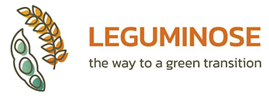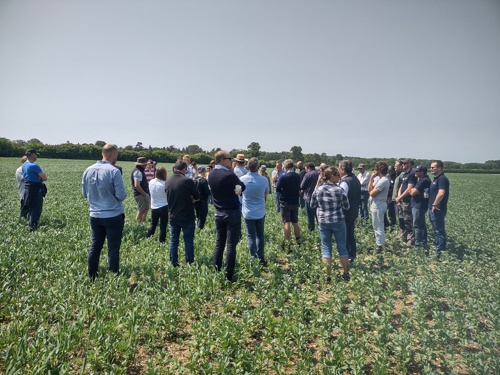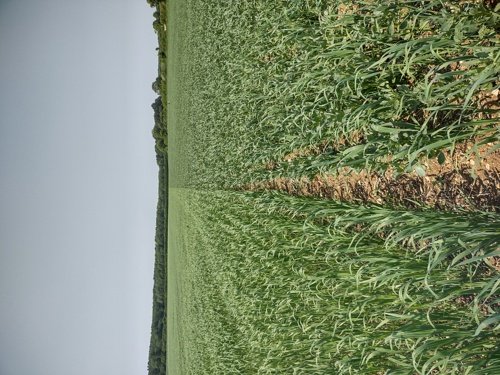



The goal of this field lab is to boost knowledge and share experiences in cereal-legume intercropping. It is part of the European LEGUMINOSE project.
Intercropping is an ancient agricultural technique where two or more plant species are grown simultaneously in the same field. Despite its environmental and economic benefits, intercropping is still a niche practice in the EU: Only 2% of European arable land is used for legume-cereal intercropping.
This field lab, and the LEGUMINOSE project in general, aims to investigate the benefits of intercropping, identify the barriers which prevent farmers adopting the practice, and provide farmers with practical, science-based information on the practice. By doing this, the project hopes to transform legume-cereal intercropping from a niche practice to a mainstream, climate smart farming practice.
This project is funded by Horizon Europe. UK funding is provided by UKRI. The project brings together a partnership of 17 organizations from around Europe. UK partners are Reading University and Soil Association. For more information see the LEGUMINOSE project description in the results and reports section of the field lab page.
This method of farming can:
The field lab will take place on over 20 farms in different location across the UK. The trials will measure yield and soil health benefits of intercrops from a range of crop mixes in organic, conventional and regenerative systems. The on-farm trial protocols will vary slightly from farm to farm, depending on the priorities and interests of the farmers themselves.




The 2024 results reveal clear benefits for the practice, including improved nitrogen levels, reduced pest damage, and greater resilience, making intercropping a practical and profitable option for arable farming.
For full results please see the reports and results section of the page by clicking on the brown banner above.
Or go to the article on our news section:
This research is part of the Horizon Europe LEGUMINOSE project.
In October 40 farmers, researchers and supply chain actors met at to hear the latest research findings from the UK LEGUMINOSE intercropping trials. The day included a presentation from Dougal Hosford, a trialist sharing his experiences, discussions around market opportunities for intercrops, and a tour of Alvan Blanch's facilities to explore post-harvest separation options.
Read about the 2024 results: Farmer led results show the benefits of intercropping
Farmer insights - Dougal Hosford’s intercropping experience 2024
Dougal Hosford joined the LEGUMINOSE trials to explore intercropping as a strategy to regenerate his thin, chalky Dorset soils and test direct drilling. While combining the intercrops was challenging, he found it manageable and a valuable learning experience. Growing winter wheat and beans together, he noted a poor bean yield, likely due to competition from the wheat. An attempt to establish clover as an understory also fell short, only sprouting the following year.
Dougal found that barley and peas provided the best margins, reducing risk in unpredictable weather. Reflecting on his experience, he recommends farmers new to intercropping start with a “clean field” to manage weeds. For Dougal, intercropping has been about finding the right balance to maximise margins, not just yields.
Intercropping market insights from Hodmedods
Hodmedods, pioneers in UK-grown pulses and grains, see intercropping as fundamental to a resilient, agroecological food system. Crop mixtures offer soil benefits and flexibility, connecting feed and human consumption markets. Wheat serves as an ideal secondary crop, providing a backup market.
Still, they acknowledge that intercropping has its hurdles. For instance, lentils, which can be prone to low growth and weed competition, benefit from being grown with Camelina, which offers structural support. Pea and barley intercrops should use yellow peas for human markets, as green peas can bleach, affecting visual quality.
Post-harvest separation remains challenging, particularly with allergenic crops like mustard. Shared equipment could help, but the right setup requires collaboration and trust between farmers and buyers. Consumer interest in environmental benefits means intercropping stories are valuable for connecting with markets.
Hodmedods continues to innovate by introducing heritage grains and new legumes to the UK market, linking soil health to consumer demand. They see intercropping as a bridge to a more diverse, sustainable food system that aligns with consumer priorities around health and the environment.
Options for separating intercrops post-harvest
Seen as a barrier to intercropping, separation of the 2 crops was demonstrated at the event with equipment manufactured by Alvan Blanch on the factory tour. Options include normal on farm cleaners through separators using gravity tables to create multiple crop samples to more complex systems separating by colour.
What’s next for the LEGUMINOSE intercropping trials?
The trial continues. Farmers interested in taking part in trials on intercropping for 2025 harvest are invited to contact the trial coordinator Jerry Alford. If you have an idea you’d like to test, such as winter intercrops or growing in strips , get in touch with Jerry Alford at jalford@soilassociation.org.
The trial plot was planted in April 2023 as part of a whole field of intercropped beans and wheat. Although not organic, the plot was not treated with any herbicides or fungicides due to the requirements of the contracted purchaser.
The wheat was a 3-way blend of varieties, and the beans were lynx. Drilling rate was based around 60% of normal farm seed rate, with the same rate for the trial area.
Harvest was 19th August with grain samples taken from the combine and combine yield monitor used to record yield. Beans and wheat were separated out for analysis.

The intercropped area produced 6% more total yield with a Land Equivalent ration of 1.16.
Wheat Quality-the wheat from both monocrop and intercropped plot were tested for protein with the following results.

Although not to milling specification, the intercropped results show that intercropping can lead to increases in grain protein. The combined wheat and bean mixture had a protein level of 14%
Economics-Sale price has been calculated based on Farmers Weekly price for non-organic crops on 18/12/23 with ex-farm prices of £179.33 for wheat and £236.08 for beans. Cost of separation and additional seed not accounted for.

Weed and Pest levels
Weed levels appeared higher in the monocultures, particularly phacelia which had self-seeded from a neighbouring cover crop margin. There was no phacelia in the intercrop plots, but small levels in both the wheat and beans although not at levels likely to affect yield.

There appeared to be a lower level of Bruchid beetle damage in beans from the intercropped section compared to that from the bean monoculture. There was more evidence of damage in a nearby whole field bean monoculture.
Conclusion
The evidence from this trial is that intercropped mixes do increase net yield and the increases in protein level do indicate that there is a synergy between both species. The anecdotal evidence from the trial will be investigated further during the Leguminose project. We are still looking for more people to be part of the trial.
Separation or marketing of the crops is important area to investigate.
View the latest webinar recording:
In June farmers, researchers and supply chain actors came together to see intercrops on an arable farm in Oxfordshire and to explore barriers and opportunities to intercropping. Read about the day in our reports and results section, by clicking on the brown banner above.

Last week over forty farmers and researchers met at a farm workshop in Oxfordshire to share their experiences of intercropping, as part of the European project LEGUMINOSE. The event was kindly hosted by Ben Adams, who is in the middle of his own intercropping trial.
Please see the event blog for further information

The next LEGUMINOSE farm workshop will be held in the autumn. For more information on the LEGUMINOSE project, or if you’re interested in taking part in the field lab, contact Jerry Alford jalford@soilassociation.org
With UK government support for companion or intercropping through SFI, there will be more interest in growing intercrops, and producing an economically viable crop is essential. We need better understanding of why intercropping is not more common, and what the barriers are to greater use of it in farming systems. To help us understand these barriers please complete the attached questionnaire so that we can arrange events farm walks and meetings to help find ways to break down these barriers.
Complete the questionnaire on intercropping
The questionnaire is hosted by Reading University.

March 2023
2023 growing season
June 2023
August 2023
October 2023
2024 growing season
August 2024
September 24
April 25
August 2025
Autumn 2025

Soil Association
Bristol / UK-wide
Arable & Soils Advisor at Soil Association, and farmer. I ran the family farm in Devon for 25 years, farming dairy, then organic beef, sheep and arable units with holiday cottage conversions. Former chairman of a local farmer owned co-op grain store, and involved in the grain supply chain nationally.

University of Reading
Reading










